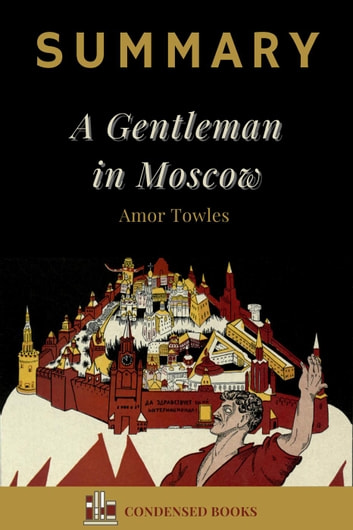A Gentleman in Moscow Summary
A high-quality summary of Amor Towles´s book A Gentleman in Moscow, including chapter details and analysis of the main themes of the original book.
About the original A Gentleman in Moscow book:
After the Bolshevik Revolution of 1917, American novelist Amor Towles’ novel A Gentleman in Moscow chronicles the narrative of Count Alexander Rostov, a Russian nobleman who is sentenced to life in the Metropol Hotel in Moscow. The Count must adjust to his new surroundings, which include a small chamber in the hotel’s belfry and the realization that his way of life is gone under the Bolshevik regime.
As the years pass, the Count sees his country changing outside his window, and he must learn to reconcile these changes with the history he values. On the other side, his time in the hotel teaches him lessons he would not have learned otherwise. As he befriends people from other countries and social classes, the Count realizes that «the inconveniences have mattered to the most» A Gentleman in Moscow delves into personal evolution, the inevitability of change, and the nature of governance and power. The narrative illustrates how people’s lives are intertwined and how the present can be informed by the past while being free of it.
A Gentleman in Moscow Summary is written by Peter Cuomo.
A Gentleman in Moscow Plot
A Gentleman in Moscow, by American novelist Amor Towles, tells the story of Count Alexander Rostov, a Russian nobleman who is sentenced to life in the Metropol Hotel in Moscow after the Bolshevik Revolution of 1917. The Count must acclimate to his new surroundings, which include a small chamber in the hotel’s belfry, as well as the awareness that his way of life is vanishing under the Bolshevik dictatorship.
The Count watches his country change outside his window as the years pass, and he must learn to reconcile these changes with the history he cherishes. His time in the hotel, on the other hand, teaches him lessons that he would not have learned otherwise. The Count discovers that «the inconveniences have mattered to the most» as he befriends people of many countries and classes. Personal evolution, the inevitability of change, and the nature of governance and power are all explored in A Gentleman in Moscow. The story depicts how people’s lives are interwoven and how the present can be informed by the past while remaining unencumbered by it.
Count Alexander Ilyich Rostov appears before the Emergency Committee of the People’s Commissariat for Internal Affairs on June 21, 1922, five years after the Bolshevik Revolution that led to Tsar Nicholas II’s execution, and is sentenced to house arrest in the Metropol Hotel, where he lives in a luxurious suite. He is said to have been sentenced to death if it hadn’t been for a poem he penned years before that appeared supportive of the Bolshevik cause. When the Count returns to the hotel, he is shown to a modest chamber in the sixth-floor belfry where servants originally resided. Despite the difficulties, the Count chooses to follow his godfather, Grand Duke Demidov’s advice and «master his circumstances».
He is served at the hotel’s Piazza restaurant by an inept new waiter whom he dubs the Bishop, not long after his house detention begins. As he eats, Nina, a young girl, comes over to his table and surprises him by asking intimate questions and voicing strong opinions. The Count meets with Nina regularly after that. Her knowledge, lack of intimidation, and earnestness impress him.
Nina uses a passkey to explore the property. She takes the Count along on her explorations, and the two of them tour the hotel’s boiler room, storage rooms, and other secret chambers. When the Count kicks off the wall of his closet, he discovers that it leads to another room, which he converts into his secret study.
Mishka, the Count’s best friend, visits him one September day. Mishka, a great poet, and Bolshevik Party supporter have always been behind the times; however, the Count is overjoyed to learn that Mishka has joined the Russian Association of Proletarian Writers. Nina gives the Count her passkey before leaving to spend Christmas with her father at home.
The Count is in the foyer on the first anniversary of his house arrest when a glamorous woman loses control of her two dogs; he and the woman have a brief, heated confrontation. Later, in the Shalyapin bar, the Count meets Mishka, who hints at a new affair with a poet named Katerina. Later, actress Anna Urbanova, who he met in the lobby, invites him to her room. She shocks him by kissing him and leading him to her bedroom after dinner and chatting. He enrages her by hanging up her shirt, and the two don’t speak for the next three years.
Nina becomes increasingly studious during the next year, and the Count meets Mishka less regularly. He is shocked to discover the Bishop is his server one night in the Boyarsky, the hotel’s formal restaurant. The Bishop had argued that pricey wines are elitist and go against the Party’s values, according to Andrey, the maître d’. As a result, all of the labels were taken away.
Helena, the Count’s sister, died ten years ago today, on June 21st, 1926. The Count contemplates changing times and attempts suicide by jumping from the Metropol’s roof; however, before he can do so, a chance encounter with a handyman he’s befriended renews his hopefulness.
By 1930, the Count is Boyarsky’s headwaiter. He forms a «Triumvirate» with Emile, the talented but irascible chef, and Andrey regularly. The three disobey the Bolsheviks’ strictures by covertly arranging to cook supper with difficult-to-find items. Nina, aged 17, and several other young Bolsheviks appear in the lobby one day. Nina informs him that they would be assisting with collectivization, which involves the confiscation of farms from wealthy kulaks. The Count has a rendezvous with Anna later that evening, with whom he has reconnected.
Osip Glebnikov, a Party officer, requests that the Count serve him in a private room. He informs the Count that, given Russia’s inevitability in the international arena, he’d like the Count to assist him in learning about French and English cultures. The two form a long friendship, meeting once a month to talk about culture, books, and American films.
Nina comes up to him in the lobby in 1938 and informs him that her husband has been arrested and condemned to five years of hard labor. She asks the Count to look after her small daughter, Sofia, for a month while she looks for a new home.
The Count feels uneasy, inept, and unable to spend his time for the next few days. The two warm to each other as the Count works to build a bed for her and play games with her. Nina is never heard from again, despite the Count’s efforts to contact her.
The Count is visited by a haggard Mishka in 1946, whom he has not seen since 1938 when Mishka was deported to Siberia for speaking out against censorship. He explains to the Count that he is working on a unique idea. The Count encounters an American aide-de-camp named Richard Vanderwhile in the Shalyapin, with whom he has a serious conversation about Russia, America, and the future.
Sofia is knocked unconscious after falling on the stairwell that evening. The Count hurries her to the hospital, where Osip assists her with her treatment while also arranging for the Count to return to the hotel in secret. Richard, who now works for the State Department, has continued to see the Count on his visits to Moscow over the years.
In 1950, the Count learns that Sofia is a brilliant pianist who has been receiving lessons from Viktor Stepanovich, the Piazza orchestra leader. Meanwhile, Richard Vanderbilt speaks with the Count about Stalin’s approaching death and the significance of maintaining diplomatic relations between their countries. He says he’ll be in Paris and would like the Count to keep an ear out for any noteworthy news. When Anna returns to town, she continues to see the Count.
Sofia is asked to perform piano with the All-Union Society for Cultural Relations with Foreign Countries in Paris in 1954. Meanwhile, the Bishop has been promoted to the hotel manager, and he continues to upset the Triumvirate by attending their daily meetings. The Count begins to make strange plans, snatching visitors’ attire and plotting ways through Paris.
He explains his plan to Sofia the night before she leaves for Paris, leaving her no choice but to go forward with it, despite her fears. Sofia and the Count have a tearful goodbye. He meets the Bishop, who has learned his scheme, shortly after she leaves, while he makes his final preparations. The Count locks the Bishop in the basement storeroom after a fierce altercation.
Sofia dons a well-thought-out disguise after her performance in Paris and makes her way to the embassy in Paris, where Richard Vanderwhile awaits her. The Count has important information in her backpack that she got during a meal with the Council of Ministers.
When the Count, who is also disguised, receives word that Sofia is safe, he flees the Metropol, having written thank-you notes to his friends and enlisting the assistance of Viktor Stepanovich, who establishes a false trail claiming the Count has gone to Finland.
The Count has gone to the Countryside, to the town where he grew up, where he meets Anna Urbanova in an inn, with Sofia safely on her way to America.




